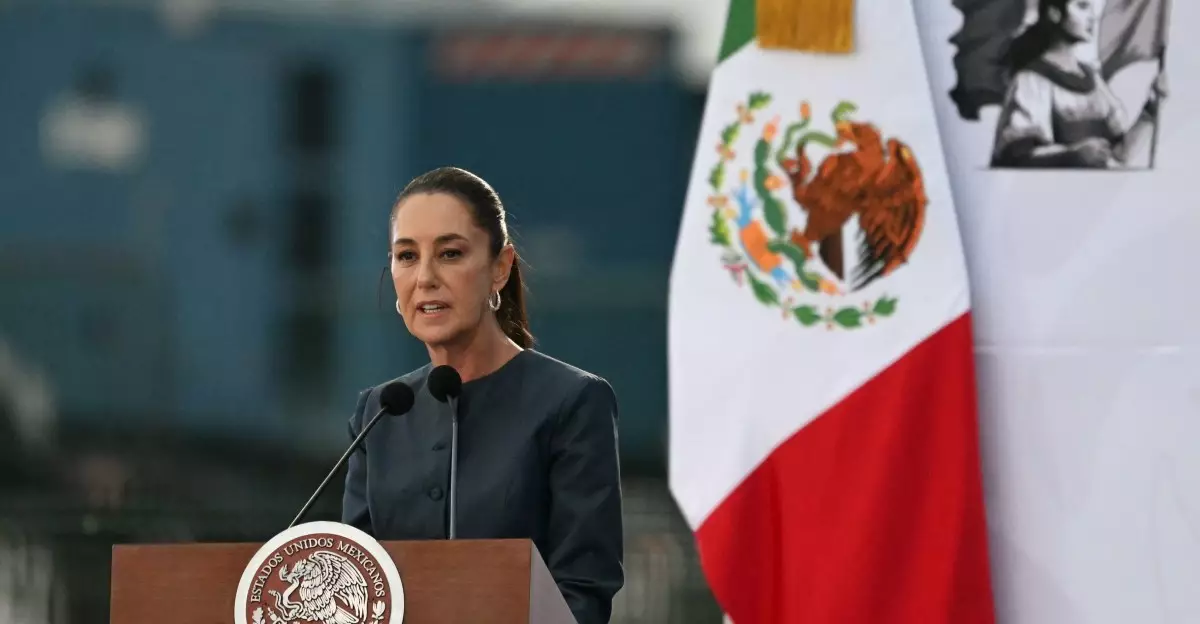In a striking move that underscores the complexities of international relations and the significance of geographical nomenclature, Mexican President Claudia Sheinbaum has taken a firm stand against the perceived injustice of a name change perpetrated by the United States. The controversy stems from a decision made under the Trump presidency to rebrand the Gulf of Mexico as the “Gulf of America” in online mapping services, a shift contested not only by political leaders but also by citizens and historians who recognize the integral cultural and historical significance of the original name.
Sheinbaum’s administration has filed a lawsuit against Google for its compliance in renaming this beloved body of water for users in the United States. The rapid and unanimous branding of the Gulf under a name that disregards its historical ties to Mexico raises critical issues surrounding sovereignty and identity. Governments often engage in symbolic battles that reflect deeper conflicts, and Sheinbaum’s actions illustrate her commitment to protecting her nation’s legacy against perceived aggression from a neighboring superpower.
The Name as a Symbol of Cultural Heritage
Names possess power; they encapsulate histories, narratives, and identities. In the case of the Gulf of Mexico, its name serves to honor not only the geographical reality but also the cultures and communities that have thrived along its shores for centuries. Sheinbaum articulated this reality during a recent press briefing, emphasizing Mexico’s right to its own geographical identity. That the U.S. government might unilaterally decide on a moniker for an international feature demonstrates a kind of cultural imperialism that remains unacceptable in our interconnected world.
Sheinbaum’s poignant statement that “we couldn’t say anything about changing the name of a state, a mountain, or a lake” resonates beyond the borders of Mexico. It challenges any nation that believes it can dictate or redefine the collective memory and identity of another. Her commitment to this issue signals an awakening awareness among global leaders that they must champion their national histories in an era where cultural homogenization looms large.
Corporate Responsibility in Geopolitical Narratives
The controversy also raises questions surrounding corporate influence in geopolitical affairs. In today’s technological landscape, companies like Google wield enormous power as arbiters of information and by extension, narratives. When Google acquiesced to the Trump administration’s directive to alter the Gulf’s name, it effectively participated in shaping a historical narrative that aligns with a specific political agenda. This complicity disregards the sentiments of millions who identify with the Gulf of Mexico as part of their geographical and cultural heritage.
Moreover, the fact that Google retained the original name for its users in Mexico but changed it for U.S. users poses profound ethical dilemmas about the responsibility tech companies hold in maintaining neutrality versus catering to political pressures. The implications of this are profound—if tech companies amplify governmental directives without critical assessment, they become vehicles for propagating potentially harmful historical narratives.
Reflections on International Relations and Technological Collaboration
The lawsuit, thus, is more than just a legal maneuver—it is a statement about sovereignty and respect. As international relations continue to evolve in the face of technology’s dominance, countries must grapple with the implications of these corporate actions. Sheinbaum’s administration has expressed its discontent in a manner that seeks to preserve Mexican dignity, insisting that international attributions should be honored and that the cultural significance of such geographical identifiers should not be trivialized.
As the world watches this legal battle unfold, it serves as a reminder that geographic names are not mere labels—they are enshrined in collective memory and identity, capable of evoking powerful reactions. The stakes are high, and as nations navigate the tumultuous waters of national identity, corporate ethics, and political influence, the outcome of this dispute will resonate well beyond the shores of the Gulf.
In their quest for recognition and representation, countries like Mexico exemplify the pressing need for nations and corporations alike to engage responsibly with our shared history—an endeavor that cultivates respect across borders in a world that often seems intent on division.


Leave a Reply